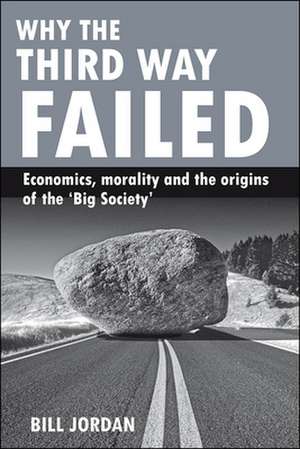Why the Third Way failed: Economics, morality and the origins of the 'Big Society'
Editat de Bill Jordanen Limba Engleză Paperback – 19 oct 2010
In the wake of the economic crash, public policy is in search of a new moral compass. This book explains why the Third Way's combination of market-friendly and abstract, value-led principles has failed, and shows what is needed for an adequate replacement as a political and moral project. It criticises the economic analysis on which the Third Way approach to policy was founded and suggests an alternative to its legalistic and managerial basis for the regulation of social relations.
| Toate formatele și edițiile | Preț | Express |
|---|---|---|
| Paperback (1) | 311.81 lei 22-36 zile | |
| Bristol University Press – 19 oct 2010 | 311.81 lei 22-36 zile | |
| Hardback (1) | 775.87 lei 43-57 zile | |
| Bristol University Press – 19 oct 2010 | 775.87 lei 43-57 zile |
Preț: 311.81 lei
Nou
Puncte Express: 468
Preț estimativ în valută:
59.68€ • 64.85$ • 50.17£
59.68€ • 64.85$ • 50.17£
Carte disponibilă
Livrare economică 31 martie-14 aprilie
Preluare comenzi: 021 569.72.76
Specificații
ISBN-13: 9781847426567
ISBN-10: 1847426565
Pagini: 232
Dimensiuni: 157 x 233 x 13 mm
Greutate: 0.36 kg
Editura: Bristol University Press
Colecția Policy Press
Locul publicării:United Kingdom
ISBN-10: 1847426565
Pagini: 232
Dimensiuni: 157 x 233 x 13 mm
Greutate: 0.36 kg
Editura: Bristol University Press
Colecția Policy Press
Locul publicării:United Kingdom
Recenzii
Bill Jordan has long been an outstanding social worker and social policy writer. In this profound book, he argues that New Labour has over-regulated welfare and even made parts of it a tool of oppression. Scholarly yet dynamic reading. Bob Holman, Universities of Glasgow and Swansea and voluntary neighbourhood worker
Bill Jordan's command of history and science, philosophy and economics, puts him in a unique position to provide a compelling critique of the Third Way. His engaging analysis of the moral and contractual regulation that underlies the current Zeitgeist is a necessary read for tomorrow's politicians, as well as for tomorrow's voters. Amir Paz-Fuchs, Ono Academic College, Israel
An incisive analysis by one of Britain's leading social theorists, this book explains why Third Way policies to regulate capitalism went in the wrong direction. Jordan's central question -- how to combine and balance economic and moral regulation -- should trigger public debate about the nature of a good society and the extent to which it is advanced by the normative message of welfare state policies that elevate employment and individual responsibility above all else. Neil Gilbert, Chernin Professor of Social Welfare, Co-Director Center for Child and Youth Policy University of California, Berkeley Berkeley, California 94720
What is particularly uplifting about this book is that it could be read positively from within any of our three major political parties, which means that it has the potential to generate a common mind on how future social policy should be shaped. Citizen's Income Newsletter
Notă biografică
Bill Jordan, Department of Social Work, University of Plymouth
Cuprins
Introduction
Part one: A moral order?: Value, virtue and justice
Snap judgments and rational choices
Nature, science and cosmology
Part two: Regulation and relationsship: What is economics good for?
Moral regulation
In search of a moral compass
Part three: The policy response: Sharing wealth, income and work
Sustaining the quality of life
Conclusions
Part one: A moral order?: Value, virtue and justice
Snap judgments and rational choices
Nature, science and cosmology
Part two: Regulation and relationsship: What is economics good for?
Moral regulation
In search of a moral compass
Part three: The policy response: Sharing wealth, income and work
Sustaining the quality of life
Conclusions














